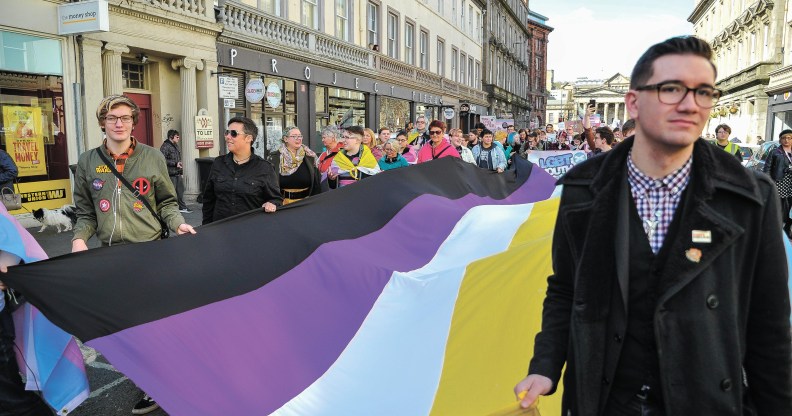Scotland backtracks on plan to include non-binary option on next census

People hold a non-binary flag at Pride. (Stewart Kirby/SOPA Images/LightRocket via Getty)
The body responsible for formulating the census questions in Scotland has quietly announced that it has u-turned on plans to include a non-binary option on the next census.
National Records of Scotland (NRS) had proposed to add a third option that would have included non-binary transgender people’s identities in the census for the first time.
But on 7 August, NRS posted a statement online that said after “careful consideration” it would “continue with a binary sex question in Scotland’s 2021 Census.”
This means the 2021 census will still only provide “male” or “female” options when asking for the sex of respondents.
James Morton of the Scottish Trans Alliance told The Guardian: “In an ideal world, we would have loved to see the addition of an answer option for non-binary trans people. However, the key issue is protecting the existing rights of trans women and trans men to answer the census with the self-identified sex in which they live.
“When combined with the additional voluntary trans status question, the self-ID sex question gives the best quality data and for the first time will enable census data comparisons between trans women, trans men, and other women and men.”
Scotland delayed gender law reforms
Scotland’s parliament unanimously approved the addition of questions about respondents sexuality and binary trans status on June 12.
But the statement from the NRS is another blow to the non-binary community in Scotland, who in June also learned that the Scottish government would not be extending legal recognition to non-binary people.
The announcement on June 20 by equalities minister Shirley-Anne Somerville was expected to contain Scotland’s plans for reforms to the Gender Recognition Act (GRA), but instead Somerville announced the reforms were being postponed and the government was reopening its public consultation on what form the reforms should take.
This was despite results of the public consultation showing that a majority of Scotland back both legal recognition for non-binary trans people.
Sixty-five percent of Scotland also backed trans people having the right to self-identify their gender for the purposes of changing their legal gender – replacing the current system, which requires trans people provide extensive evidence of their gender including a medical diagnosis of gender dysphoria.
Trans people, like most people, currently self-identify their gender on a daily basis.

